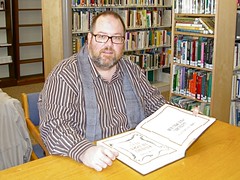Two of the books I read over the holidays were about the loss of world languages. The first, Language Death by David Crystal, presented a well-written, concise, but very academic -- relatively descriptive view -- about the death of languages. The second, Vanishing Voices by David Nettle and Suzanne Romaine, presented a comprehensive model for how and why languages are being lost and a number of anecdotes that illustrate how minority languages are being rescued and preserved, and how these might be implemented in other contexts.
The book includes many fascinating examples and anecdotes of how different languages embody unique world-views of the speakers. My favorite was a set of anecdotes about avoidance speech. In the presence of certain taboo relatives, speakers are required to use a different language. In the Dyirbal language, this language had the same grammar, but the nouns, verbs, and adjectives were mostly different. Dyirbal also had a noun classification scheme built into the grammar that I took to be rather like the inverse of gender. Men (and a bunch of things including animals) belonged to one category, women (and a bunch of things including birds, fire, and other "dangerous things") belonged to a second, with a couple more categories besides.
The initial chapters focus on what language death is, describe a range of different historical causes, document that language death is happening, and recognize discernible phases of language death. Later in the book, a model is presented that when languages of differing prestige are brought into contact, the first generation's children generally become bilingual in the traditional language and high-prestige language, but that second-generation's children generally are monolingual speakers of the new language, and the traditional language is lost.
In the end, they see the issue as fundamentally about economic power -- and the allure of a Western lifestyle. Traditional cultures make a Faustian bargain when they pursue the unsustainable lifestyle of westerners. Too often, they end up losing everything.
An important theme of the book is the close identification with language diversity, cultural diversity, and biodiversity. Local languages and their cultural knowledge become irrelevant as local ecosystems and associated ways of life are destroyed. The wealth of unique words that describe particular species and their uses offer little value when those species are gone, never to return, after clear-cutting, mining, or the introduction of mechanized farming. Unfortunately, western extractive industries and agricultural techniques often leave land less productive than it was under the original ground cover, and another indigenous people becomes a population of refugees in the blasted hellscape that remains of their Eden.
The authors focus on a range of projects illustrating how minority languages can be sheltered and valued -- in several instances documenting how traditional knowledge and cultural practices husband the resources of an area better than transplanted Western models. Key parts of rescuing languages involve improving their prestige and ensuring that speakers do not suffer economic consequences for retaining their native language. It's not a solution that global capitalism will support on its own.

